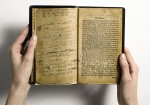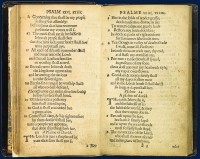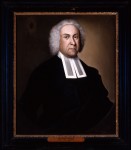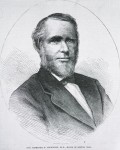 The Bay Psalm Book, the first book printed in British North America 136 years before it became the United States, is one of the rarest books in the world. There are only 11 copies known to have survived, and they are all held in libraries: the John Carter Brown Library, the Yale University Library, the Bodleian Library, the Library of Congress, the New York Public Library, the Henry E. Huntington Library, Harvard University Library, the American Antiquarian Society, the Rosenbach Library & Museum and two copies in the Boston Public Library which belong to Boston’s Old South Church. One of those copies, known as the Beta Copy because it’s slightly less pristine compared to the Alpha Copy, will be going on the auction block at Sotheby’s in November.
The Bay Psalm Book, the first book printed in British North America 136 years before it became the United States, is one of the rarest books in the world. There are only 11 copies known to have survived, and they are all held in libraries: the John Carter Brown Library, the Yale University Library, the Bodleian Library, the Library of Congress, the New York Public Library, the Henry E. Huntington Library, Harvard University Library, the American Antiquarian Society, the Rosenbach Library & Museum and two copies in the Boston Public Library which belong to Boston’s Old South Church. One of those copies, known as the Beta Copy because it’s slightly less pristine compared to the Alpha Copy, will be going on the auction block at Sotheby’s in November.
It’s been two generations since the last time one of these psalters was offered for sale. In January of 1947 it sold at auction for what was then a record $151,000 to rare book dealer Dr. Abraham Simon Wolf Rosenbach. Rosenbach had set the previous record for a book in the English language sold at public auction when he bought a First Folio of Shakespeare for $72,000 in 1933. He also held record for the most expensive book period bought at a public sale, a Gutenberg Bible he had purchased in 1926 for $106,000. This little six-by-five-inch hymnal of psalms blew them all away. Rosenbach turned out to be acting as an agent for a group of Yale alumni who in September of that year donated the Bay Psalm Book to the university library.
 Old South Church has decided to part with one of their copies because it might make as much as $30 million, a princely sum that will allow it to remain solvent while fulfilling its Vision for the 21st Century (pdf), a mission statement that covers everything from building renovations to art programs to support for the poor. The church will still retain ownership of the Alpha Copy and that one is governed by a number of restrictions on sale so it’s not going anywhere.
Old South Church has decided to part with one of their copies because it might make as much as $30 million, a princely sum that will allow it to remain solvent while fulfilling its Vision for the 21st Century (pdf), a mission statement that covers everything from building renovations to art programs to support for the poor. The church will still retain ownership of the Alpha Copy and that one is governed by a number of restrictions on sale so it’s not going anywhere.
In 1640, 20 years after the Pilgrims landed in Plymouth, the good folk of the Massachusetts Bay Colony decided the books of Psalms they had brought with them from England just wouldn’t do anymore. They thought the translations were too distant from the original Hebrew, and since the colony now had a printing press imported from London and operated by an indenture locksmith named Stephen Daye, they set about making their own psalter. A group of 30 “pious and learned” ministers, all literate in Greek, Latin and Hebrew, each translated a section of the Book of Psalms into English verse. John Eliot, Thomas Weld and Richard Mather (grandfather of the Cotton Mather of Salem Witch Trials fame) edited the volume.
 The psalms were meant to be sung during services as hymns, but the quality of poetry was clearly not the ministers’ priority. Look, if you dare, at the broken and battered corpse of the 23rd Psalm:
The psalms were meant to be sung during services as hymns, but the quality of poetry was clearly not the ministers’ priority. Look, if you dare, at the broken and battered corpse of the 23rd Psalm:
The Lord to mee a shepheard is,
Want therefore shall not I.
Hee in the folds of the tender-grasse,
Doth cause mee downe to lie:
To waters calme me gently leads
Restore my soule doth hee:
He doth in paths of righteousness:
For his names sake leade mee.
Yea though in the valley of deaths shade
I walk, none ill I’le feare:
Because thou are with mee, thy rod,
And staffe my comfort are.
For mee a table thou hast spread,
In preference of my foes:
Thou dost annoynt my head with oyle.
My cup it over-flowes.
Goodness & mercy surely shall
All my dayes follow mee:
And in the Lords house I shall dwell
So long as dayes shall bee.
Yeah. I feel bad for any deity who had to listen to that for hours on end, week after week, while presiding over those interminable Puritan meetings.
After the ministers were done butchering the classics, 1700 copies of the book were published, enough so every family in the colony could have one. It was the third work published by the Stephen Daye press, but the first book. (The first piece printed was a broadside of the Oath of a Freeman, now lost, and the second an almanac in pamphlet form.) Despite its atrocious turns of phrase, the Bay Psalm Book remained popular for decades after that first print run, with multiple revised editions published during the 17th century.
 In 1703, bibliophile and historian Reverend Thomas Prince, who was then still at Harvard University, began to build a “New England library,” a collection of every written work, manuscript or printed, pamphlet, paper or book, ever made in New England. Fifteen years later the good reverend was appointed pastor of the Old South Church and remained such until his death in 1758. During his five decades plus of collecting, Prince purchased no fewer than five copies of the Bay Psalm Book, a remarkably prescient choice considering that the books were still fairly widespread at that time.
In 1703, bibliophile and historian Reverend Thomas Prince, who was then still at Harvard University, began to build a “New England library,” a collection of every written work, manuscript or printed, pamphlet, paper or book, ever made in New England. Fifteen years later the good reverend was appointed pastor of the Old South Church and remained such until his death in 1758. During his five decades plus of collecting, Prince purchased no fewer than five copies of the Bay Psalm Book, a remarkably prescient choice considering that the books were still fairly widespread at that time.
In his will he bequeathed the entirety of his library to the Old South Church, stipulating that it remain together in perpetuity. That didn’t happen. For 46 years, half of his books were kept at the Massachusetts Historical Society. The collection was reunited at the Boston Public Library in 1866. Or rather, most of his collection was reunited, because somewhere in the penumbra of those decades, three of the five copies of the psalm book had mysteriously moved on.
 By the mid-19th century, the Bay Psalm Book was exceptionally rare and certain collectors lusted after it with an unscrupulousness that would have made King David blush. Three private collectors — Edward A. Crowninshield, George Livermore and Nathaniel B. Shurtleff, 20th mayor of Boston — all educated men of wealth and position, had wheedled copies out of Old South Church deacons by offering deceptively dismal trades or simply by flattery. Shurtleff scored the best of the five: Richard Mather’s own personal copy bearing his autograph. Crowninshield secured the copy that would be auctioned in 1947.
By the mid-19th century, the Bay Psalm Book was exceptionally rare and certain collectors lusted after it with an unscrupulousness that would have made King David blush. Three private collectors — Edward A. Crowninshield, George Livermore and Nathaniel B. Shurtleff, 20th mayor of Boston — all educated men of wealth and position, had wheedled copies out of Old South Church deacons by offering deceptively dismal trades or simply by flattery. Shurtleff scored the best of the five: Richard Mather’s own personal copy bearing his autograph. Crowninshield secured the copy that would be auctioned in 1947.
Old South Church authorities didn’t cotton on to these shenanigans until 1875. They sued Shurtleff’s estate to get the Mather copy back, but it was too late. The statute of limitations had run out. That copy is now in the John Carter Brown Library at Brown University. Had the deacons not been such saps, Old South Church would be rolling in $30 million books.